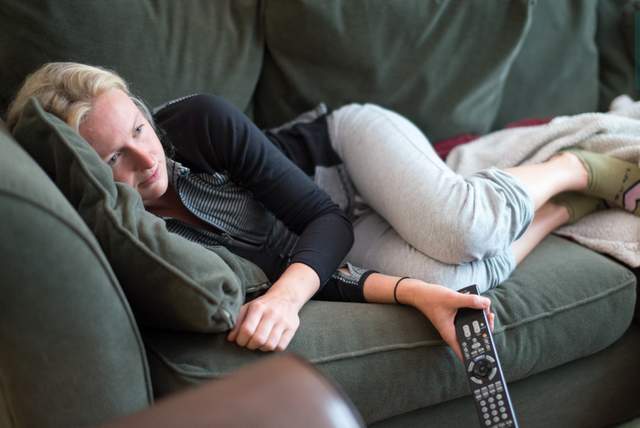
Some Boston Marathon hopefuls had to deal with heartbreak long before they reached the eponymous hill in Newton.
While Boston always carries a special significance, runners this year were even more determined to prove the running community’s resilience after two bombs went off at the finish line in 2013. Some, however, were sidelined by injury after months of training and anticipation for what they expected to be one of the most emotional and memorable marathons of their lifetime.
“It wasn’t until I signed up and was registered that I started to really feel the impact of how special an opportunity it would be to run this year with everything that has happened and just how emotional and special it’d be this year,” said Phoebe Markle, an Alexandrian who was set for her first Boston. “To be a part of that, I don’t take that for granted.”
She made it through 13 weeks of training when she ran a 22-mile long run a little too fast and felt some pain in her calf. She tried to push through, not wanting to miss out on training so close to the race. But eventually, she had to confront the reality that she may not be able to run. She went to the doctor and the problem was diagnosed as a strained calf.
Whether she would run was up in the air until just a few days before the race, when her physical therapist told her not to run, worried it could be a stress fracture. Discouraged, she felt like all the hours and miles logged were for nothing.
“That was my priority, training through the winter. I got in every workout through the polar vortex, in the ice, wind, snow,” she said.
She has already qualified for the 2015 Boston Marathon and said she will try again then and “train smarter.”
With plans to drive to Massachusetts with her boyfriend and stay with friends, Markle was, financially, just out her entry fee. Others weren’t so lucky and had far less flexible travel plans. When Emory Ford of Kensington got hurt about a month before the marathon, he forfeited his entry fee and the cost of his travel plans and hotel for the weekend.
“It was an expensive choice to not run and to cancel my plans,” he said.
Ford was skiing with his son in West Virginia when he landed wrong and injured his back.
“Something I probably shouldn’t have done — a ski jump,” he said. “I landed on my back. I’ve been having issues with my sciatic nerve, it’s hard to stand up and sit down and it causes my calf muscles to tense on the left side.”
He wasn’t able to run at all with the injury and realized he would not be able to do the marathon, though he said he’ll likely try to run it next year.
“It’s too bad I couldn’t go this year, though, because I’m sure it’s going to be extra special,” he said.
For Mike Gorfinkle, running Boston this year was about finishing what he started in 2013. He ran for a charity in honor of his cousin who died of cancer and was about half a mile from the finish line when the the bombs went off. Now an Ellicott City resident, he grew up in Boston watching the race, and was one of 5,000 runners who couldn’t finish last year and was invited back in 2014, but ran into trouble when he strained his Achilles tendon playing with his daughter after a long run.
“Any other race, I would just wait for the next one and get better,” he said. “But for this race, I’m not by any means a professional athlete, but it’s like playing in a big game.”
His doctor told him that under any other circumstances, he would advise Gorfinkle not to run, but that he understood this was a “once-in-a-lifetime” race. Determined to run the race, Gorfinkle abandoned his sub-four hour goal and planned on taking walking breaks every two miles.
“I figured I’ll run as far as I can until I can’t anymore, and then I’ll drop off at a medical tent,” he said before the marathon. “Normally when I run races, there’s some competition to it, but for this race, it’s more about being there for the day and celebrating and remembering what happened last year.”
Gorfinkle finished the marathon in 5:46. He said it was very difficult to run through his injury and even had to stop at a medical tent along the course to ice his Achilles tendon for about 20 minutes.
“But I made it,” he said.
Arlington’s Daryle Lademan also managed to cross the finish line in Boston, despite battling injuries for almost three months. In February, she was out of training for about three weeks with shingles, then just a few weeks later, starting having pain in her IT band. Though her coach didn’t approve, she made a last-minute decision to run, “because it was Boston.”
While she initially just flew in to pick up her number and maybe run the B.A.A. 5k two days before, she ended up on the bus to the starting line in Hopkinton the morning of the marathon.
“I had a $20 bill in my sports bra. I figured, worst case, I pop out at the halfway point and take the T back to Boston,” she said. “I got to the halfway point and (her IT band) was doing alright; it probably was adrenaline. I just sucked it up and went all the way to Boston.”
In addition to wanting to participate in this year’s marathon to take back the finish line, Lademan had the added motivation of having to pull out of last year’s marathon two weeks before the race with another injury.
“I thought ‘No, damnit, I’m not sitting this one out,’” she said. “I was bound and determined to pull out all the stops to make it happen it year.”
She went out without a time goal and ended up finishing in 3:42 – not a personal best time by any means, though it was definitely a personal best race experience.
“It was absolutely the hardest race, but also the most life-affirming race I’ve ever run,” she said. “The thought that I might have not run it, or might not have given it a try because I wasn’t well trained, or I wasn’t going to PR, my heart just breaks thinking about that because I would’ve missed out on the best running experience of my life.”
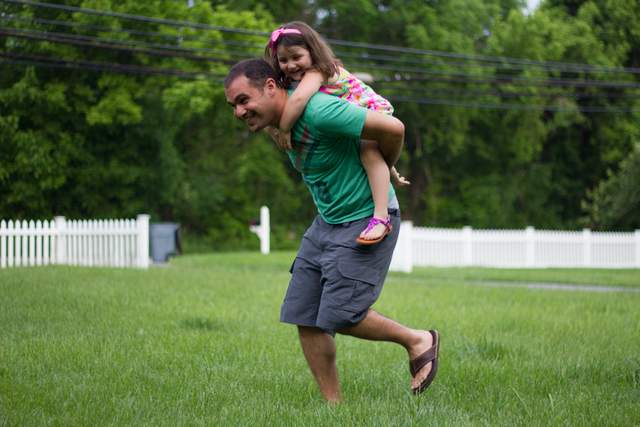
This story originally appeared in the July/August 2014 RunWashington.
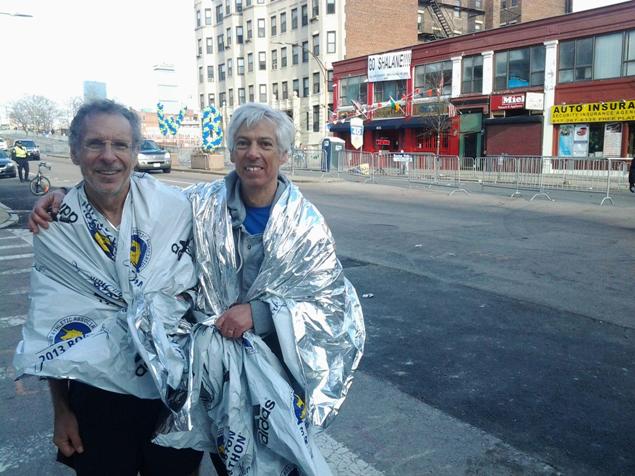
Don’t feel sorry for Ben Beach.
Yes, his goal of a string of 45 consecutive Boston Marathon finishes seemed to end on a closed course just miles from the finish line last year, where two bombs rocked the city and the nation. And yes, a 46th consecutive finish would have made Beach, from Bethesda, the sole record holder for consecutive finishes, an achievement he had worked toward all of his adult life. He didn’t get to cross the finish line as planned and for two months, his streak’s fate was in limbo.
But the Boston Athletic Association decided to consider the more than 5,000 runners on the course after the race was cut prematurely short, “finishers.”
“I think all of us with long streaks take the BAA’s view that our streaks grew by one year in 2013,” he said, a week before he starts number 47.
But Beach, a man who embodies the tradition and ideals of the Boston Marathon, is defined by neither the race nor his remarkable streak. Given the gravity of that day, he can look past what would have been a culmination of 1,205.2 racing miles on the same stretch of roads.
“First of all, we’re talking about a day on which three people lost their lives and 270 others were injured, many severely,” Beach says. “So for me to talk about my run and the streak feels hollow.”
Perhaps. But the Boston Marathon, before the bombs, anyway, was a nice little race in its own right, with champions – anyone remember Lelisa Desisa and Rita Jeptoo? – thousands of qualifiers and hallowed, not hollow, history and records.
Beach was set to own outright a remarkable piece of that history with this year’s run. Since his first Boston as an 18-year-old Harvard freshman in 1968, Beach competed in lockstep – albeit one year behind – with Pennsylvanian Neil Weygandt, each runner doggedly starting and finishing every year. But age and injuries finally caught up to Weygandt, who ended his streak by sitting out the 2012 race. Upon completion of the marathon last year, Beach tied Wygandt’s record at 45 straight finishes.
As if it were that easy. The early decades featured a string of sub-2:40 finishes, including his Boston-best of 2:27 in the 1983 race. But 11 years ago Beach developed a hitch in his stride, diagnosed as dystonia, a neurological disorder related to Parkinson’s Disease. The problem made training difficult and forced Beach to curtail his weekly mileage. In more recent years, pre-marathon long runs have been no longer than the Cherry Blossom Ten Mile Run in Washington just prior to Boston.
Beach credits the streak’s current longevity to treatment at the nearby National Institutes of Health, where he is part of a long-term study and receives regular Botox injections that partially block spasm signals from the brain to the left hamstring. Beach walks with a slight limp and his training runs have grown necessarily shorter; these days he maintains most of his cardiovascular fitness through cycling and an elliptical trainer. Fifteen days before this year’s Boston, Beach completed his Cherry Blossom long run in 1:30:33. Would anyone be surprised to learn that Beach is the only runner to have completed every Cherry Blossom race since its inauguration in 1973?
So with family and friends scattered along the Boston course, Beach set out from Hopkinton with longtime friend, training partner and Cherry Blossom race director Phil Stewart. “We had planned on running in the 4:30 to 4:45 range, a time that would have put us at the finish a half hour after the bombs went off,” Stewart said. “But Ben was nursing a calf problem, and at 10 miles he felt a sharp jolt of pain through his calf, reducing us to a quick walking pace. At 17 miles, two of his three kids and a daughter-in-law joined us – I felt as if we had a guided escort into town.”
But by the time the entourage reached the 21 Mile mark, it was past 2:50 p.m. and the area around the finish line had devolved into chaos. As Beach and his crew passed Boston College, volunteers joined hands in the middle of the road, halting the race and announcing a temporary suspension.
“We had heard something about explosions near the finish line,” Beach said. “At first we didn’t know how seriously to take it. Then we heard sirens, saw police motorcycles, trucks and cars blow by us. Something was clearly not right…. We were on pace to finish in less than six hours, which is the last official time recorded. When the course was sealed off, we gathered, stood, sat and scratched our heads.”
The gravity of the situation slowly became clear. With a fading cell phone signal and before all such transmissions were halted, Beach’s son Carter accounted for Beach’s wife, brother, sister-in-law and friends waiting near the finish line. “That was a tremendous relief,” Beach said. “We had some close calls but overall we were very lucky.” But for a blown-out calf, Beach, his family and friends could have found themselves in the middle of serious trouble.
“It was a good day to be bad,” Stewart said.
“I’ll abide by whatever [BAA officials] say,” Beach said. “Boston has been such a wonderful part of my life and the BAA is always so accommodating for those of us who don’t technically qualify anymore. No matter what happens to the streak, I’ll be back.”
Actually, when pressed, Beach admits he’s got his sights set on another Boston milestone – one perhaps even more Ruthian than consecutive finishes. The great Johnny Kelley started 61 Boston Marathons and finished a record 58 times; depending upon how the 2013 race is officially recorded, and, of course, what the future holds, Beach would be 76 when he lines up for what could be his 59th finish.
“Now I’m not comparing myself to Johnny Kelley,” Beach added quickly. “He was a two-time Olympian and twice won Boston. [His starts and finishes] are a mind-blowing pair of numbers, in a different era, with different shoes, different everything.”
Beach has already matched Kelley at 17 for the number of sub-2:40 finishes. “But I don’t expect to run an 18th,” he said.
Look for Ben Beach at the starting line of next year’s marathon. And the one after that, and after that, and….
“My plan has always been to run Boston as long as I can do it,” Beach said. “It’s conceivable I’ll still be going but the body’s got to hold up. At each stage, you never know what’s going to happen.”
Now he’s in his best condition of the last few years. On April 21, he’ll get that chance to do what has hasn’t in two years — cross the finish line.
“It’ll feel better than usual, I know that,” he said. “It’ll feel a lot better.
Of the Washington, D.C. area’s tens of thousands of runners, 865 have registered for the 2014 Boston Marathon. The list has been updated to reflect a more comprehensive search of local runners
[button-blue url=”http://www.runwashington.com/wp-content/uploads/2014/04/Boston-entrants-2014-revised.pdf” target=”_self” position=”left”] See this year’s local entrants [/button-blue]
Injuries and other curves balls that life can throw will keep some of the runners from starting on Monday, April 21. Of the registered runners, 228 are from Washington, D.C., 209 are from Maryland’s Montgomery and Prince George’s counties and 428 are from northern Virginia, including 112 from Arlington County, alone.
Of note, Silver Spring’s Alan Pemberton won the 60-64 age group at last year’s Boston Marathon.
Here is a look at the top 10 local men and women who finished the 2013 race, 11 of whom are heading back.
2013 top local finishers
Men and their overall place (Bold means they are registered for 2014)
57. Patrick Kuhlmann,Washington, D.C. 2:28:01
64. Andrew Dumm, Falls Church, Va. 2:28:33
109. Stefan Kolata, Washington, D.C.2:34:01
128. Gregory Mariano, Alexandria, Va. 2:34:57
149. Joe Kelly, Washington, D.C. 2:36:16
180. Dickson Mercer, Washington, D.C. 2:37:24
190. Tripp Southerland, Washington, D.C. 2:37:44
221. Matthew Thomas, Alexandria, Va. 2:38:33
278. Christopher Bain, Takoma Park, Md. 2:40:29
288. Jason Dwyer, Sterling,Va. 2:40:53
Women and their overall place
59. Teal Connor, Washington, D.C. 2:52:35
60. Julie Tarallo, Washington, D.C. 2:52:50
112. Kaitlin Sheedy, Washington, D.C. 2:58:44
113. Kara Waters, Great Falls, Va. 2:58:50
114. Perry Shoemaker, Vienna, Va. 2:58:53
154. Kelsey Budd, Oakton, Va. 3:01:21
216. Anna Bernal Cabin John, Md. 3:05:14
224. Melani Hom, Washington, D.C., 3:05:31
230. Nicole Terry, Arlington, Va. 3:05:46
268. Lauren Shaub, Arlington, Va. 3:07:27
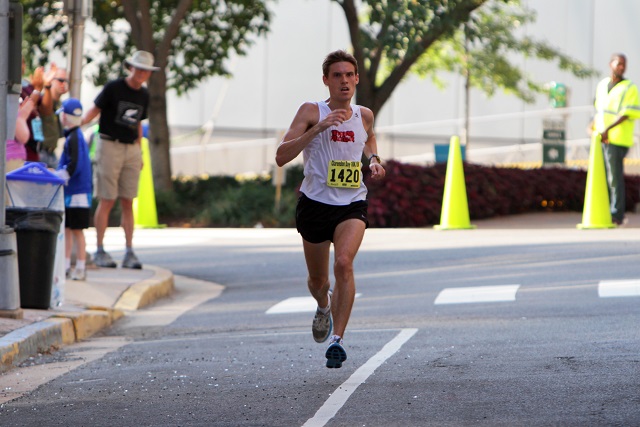
If the conditions are right, competitive marathoner Scott Allen, 27, of Washington, D.C., has his eyes on a PR in Boston.
It’s an ambitious goal.
A personal record at the monumental 2014 Boston Marathon on April 21 would mean beating his current record of 2:36:05 from the 2012 Rock ‘n’ Roll USA Marathon, where Allen placed third overall.
“Boston – there really is no experience like it,” Allen says. “I can only imagine how big the energy will be after last year’s bombings. It would really be great to PR.”
Allen came in 157th in the 2011 Boston Marathon and he is optimistic for another great run this year.
Because of the response to last year’s bombings and a higher number of qualifiers, though, the field is much bigger.
Allen had the same qualifying time as in 2011, when his bib number was 262. This year it’s in the 400s, which means there are an additional 200 people who had a faster seed time.
“It’s going to be huge,” he says. “It’s cool being a part of something that shows our response to last year’s bombings. We are not going to let this bombing deter us. People aren’t going to let that ruin such a big day for Boston and the country.”
After running the Rock ‘n’ Roll USA half marathon in March, Allen suffered a leg injury that kept him from running for two weeks. “This injury kind of set me back,” he says. “But I feel like I am almost back to where I need to be. I am not sure if I am going to be in my PR shape but I will have a solid race.”
Before the taper started, bringing him down to a weekly 55 miles, Allen averaged about 80 miles a week on some of his favorite routes: along the mall, by the Georgetown Waterfront, Capital Crescent Trail, Haines Point, Custis Trail – where he heads for the hills – and Rock Creek. “There isn’t really anywhere where I don’t like running,” he says.
“This season the most I did in one week was 82 miles,” Allen says. “I was hoping to get closer to 90 but I had a muscle injury and just wasn’t able to.”
Ideally, when he is feeling healthy, Allen takes only one day off a month.
A peak week usually includes a long run of 20-22 miles and two workouts – hard hill repeats and two by four miles at goal half marathon pace. The other days are filler runs – 8-10 miles– sometimes a bit more.
As for fuel, Allen loves his carbs. “The night before a race I like to have pasta – eat a big meal. For breakfast? A bowl of cereal.”
He doesn’t go for the healthy stuff. Cocoa Krispies did the trick in Delaware. Cinnamon Toast Crunch was his go-to before this weekend’s 20-mile long run. He isn’t sure which cereal it will be for Boston, but he plans to eat a lot of it, he says with a laugh.
As a third year law student at Georgetown, Allen is trying to get as much competitive running in as he can.
“I don’t know if it will be possible to run this much and be a lawyer,” Allen says. “I am just not sure if I can be quite as intense when I am working, but running is not something I am going to give up.”
Although he’s always been a runner, Allen didn’t know he’d have a gift for marathons until he crossed the finish line of his first: the 2009 Marine Corps Marathon.
“I had no idea how I would do on race day,” Allen says. “But I ended up with 6:08 miles. Being good made we want to keep going.”
Allen is originally from Wisconsin. He went to Marquette University where he ran cross-country and track.
“I’ve been running since middle school,” he says. “But I didn’t get into the 80 plus area until I started doing marathons. Some bodies just cannot withstand high mileage but I have good genes, good muscular structure.”
The highest mileage he ever did in one week was 102 – before Boston in 2011.
“That was kind of crazy,” Allen says. “It’s better to think long term. Do 60 miles a week and be healthy rather than trying to push it to 80. If you do that much you’re bound to get hurt.”
Allen is not exempt from that. A knee injury kept him out of last year’s Boston Marathon.
“It is disappointing to put in a lot of time and then get injured,” Allen says. “Every season I get another injury and I always think – ‘this could be the thing that takes me out of the season.’”
But so far, no injury has been bad enough to keep him from lining up in the first wave of runners in Boston later this month.
After Boston, Allen plans to take it easy until the fall season picks up. “You can’t be intense the whole year. I need those breaks from running a little bit,” he says. “After the marathon I’ll take one week of no running. I like to take it easy for a couple months and do no more than 30 or 40 a week. For the fall I’ll start in June to pick it up to 60.”
Now, Allen runs on the Pacers-New Balance racing team. On Boston Marathon Monday, he’ll be sporting a team black jersey and shorts. “I’ll be wearing New Balance because they sponsor our team,” he says.
For now, it’s all about getting to the starting line safe and healthy. And Allen’s focus is all Boston.
“With what happened last year, there will be even more energy so the whole atmosphere will be really neat,” Allen says. “There is nothing quite like being in a marathon with that many spectators. Nothing like Boston.”
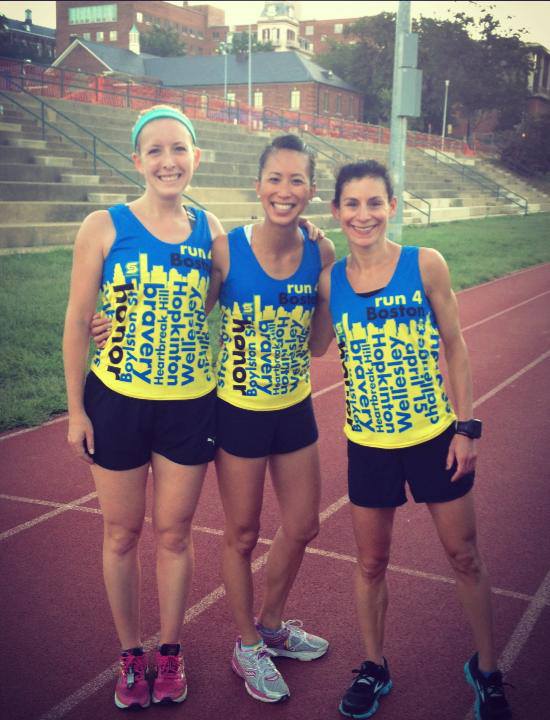
Ask Melani Hom to recount how April 15, 2013 unfolded through her eyes and she still gets emotional a year later.
The date – if it hasn’t been engrained in runners’ memories – was last year’s Boston Marathon, where scenes of rescue workers attending to bloody finish line bystanders overtook those of happy, finisher medal-wearing runners.
The Northwest D.C. resident had just crossed the finish line in a personal record time of 3 hours, 5 minutes, but the coach in her wanted to stick around and cheer for other runners as they came in.
She credits what she calls a “selfish moment” of leaving the finish area to go shower and recover at her cousin’s apartment in Boston where she was staying as saving her life.
Her voice cracks and tears well up in her eyes when thinks about the chaos that ensued trying to find her friend, fellow Boston racer Lauren Gabler, and the loss of life and limbs that day.
“Just having that experience that all that can go away in a split second,” Hom, 29, said. “It’s not just about racing.”
Hom and Gabler – who remembers well watching the news coverage in the Italian restaurant in the first floor of a hotel a mile from the finish line – wanted to give back to the race, the sport, the community that had given so much to them.
“We both felt like we needed to do something more because we were so lucky that day,” said Gabler, 30, of Arlington, who heard and felt the blasts a block away from the Boylston Street finish.
Gabler and Hom met during a Ragnar Relay race in D.C. some time ago and their friendship grew out of the shared passion for running. Together they crafted the idea of creating and selling commemorative Boston running jerseys – singlets that could be worn during races or runs.
“Instead of just throwing a happy hour or creating a fundraising page, I wanted to do something a little bit different,” Hom said. “We wanted to give people who donated money a takeaway and a constant reminder.”
These do-gooders knew the jerseys could be sold to their runner friends to commemorate the race with the proceeds going to One Fund Boston, a charity to collect donors for those affected by the Boston Marathon bombings.
“It’s a way to bring everyone together whether they ran Boston or not,” Gabler said. “It’s for any runner who felt personally affected by the events whether they were at the marathon or just runners who feel an attachment to the sport.”
Hom was talking to a contact she had through her local triathlon training company — Laava Performance — who designs and makes flashy triathlon gear shortly after the race. When Hom mentioned she ran the Boston Marathon, the woman on the other end of the phone, Boston native Kristin Mayer, instantly offered her design services.
From there, the idea started to come to reality.
The proposed jersey bore inspiration words like “strength”, “honor”, “heroes”, and “bravery” mixed with familiar Boston towns and landmarks like “Hopkinton”, “Wellesley”, “Heartbreak Hill”, and “Boylston Street”.
It would also have the date of the 2013 race – April 15 – and were blue and yellow in Boston style, of course.
“They’re pretty flashy. I’m not going to lie,” Gabler said. “There’s a lot going on. They look really cool. I feel like on race day you’re allowed to wear something like that.”
Having the designer confirmed, Hom reached out to get the apparel. Everyone she talked to in the initial steps – even though coming from the cycling or triathlon world – wanted to help the runners’ cause.
The two started an Indiegogo campaign, a crowdfunding site, to help raise money and get their efforts off the ground. The site would carry a brief summary of their project with people able to buy a jersey through their webpage. If enough orders were gathered, they could be purchased for everyone.
They needed to raise at least $4,000 to bring the jerseys to life.
Gabler, a communications consultant with a constantly bubbly and energetic personality, would drum up support in the running community. She reached out to her running friends through different running groups weekend long runs and weekday track workouts. Melani dug into her triathlon network.
Gabler established a Facebook page to generate interest for the effort – “Run4Boston” – which has more than 200 followers today.
“People from all over the country bought them,” Gabler said. “There were a lot of D.C. who bought them, but then there were people in California and Colorado have all bought the jerseys.”
Gabler had friends from high school – people she hadn’t spoken to in years but were runners – buy a jersey. Hom’s sister in California made a promotional video for the campaign.
By early June, less than a month after they started, the project had 92 supporters and more than $4,300. The project sold roughly 100 jerseys to date and donated more than $3,000 to One Fund.
“We didn’t know if only our parents would buy them or random people would buy them,” Gabler said. In the end, it was a good bit of both.
Those from across the country who bought their jerseys have sent pictures of them wearing their new garbs in races.
The jerseys have been spotted in several local races including the Army 10 Miler.
Gabler wore hers during the Marine Corps Marathon last October. Their promotional Facebook page carries pictures of runners as recent as March’s Rock ‘n’ Roll USA Half Marathon wearing their blue-and-yellow shirts during races.
“You actually do see them,” Gabler said. “Because they’re kind of flashy, they’re hard to miss.”
Because of the nature of Indiegogo, only those who ordered a jersey during the campaign received a jersey. Hom and Gabler would have to repeat the process – which takes a great deal of money to get off the ground.
The two women are returning to run the Boston Marathon again next week. This time they’ll wear the jerseys they helped create.

